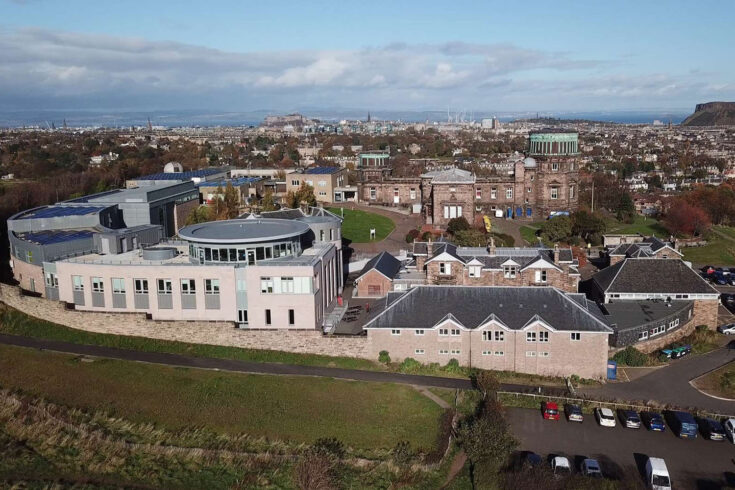Science and Technology Facilities Council
|
|
UK Astronomy Technology Centre celebrates 25 years of innovation
25th anniversary for the national centre for excellence in the development of scientific instrumentation for ground and space-based astronomical observatories.

View of the Royal Observatory Edinburgh. Credit: UK ATC
For 25 years the UK Astronomy Technology Centre (UK ATC), part of the Science and Technology Facilities Council (STFC), has been delivering on its mission to develop the most powerful astronomical instruments and telescopes in the world.
Based at the Royal Observatory Edinburgh the UK ATC regularly collaborates with NASA, the European Space Agency, UK Space Agency and the European Southern Observatory.
Delivering engineering excellence in collaboration with national and international organisations, universities and commercial partners. Working together to answer the biggest questions about the origins and evolution of our Universe.
Global reputation
Since launching in 1998 the UK ATC has built a global reputation for expertise in high precision manufacturing, assembly of instrumentation, infrared astronomy, adaptive optics and software tools that allow astronomers to meet their science goals.
Major projects include instruments for telescopes in Hawaii and the Canary Islands, the design and construction of the Visible and Infrared Survey Telescope for Astronomy (VISTA), which is part of the Cerro Paranal Observatory in Chile.
Current work includes:
- software for the Square Kilometre Array Observatory (SKAO), the worlds’ largest radio observatory, based in Southern Africa and Australia
- instrumentation for the Very Large Telescope and Extremely Large Telescope in Chile
- building the optical benches for the Laser Interferometer Space Antenna’s (LISA) mission to study gravitational waves
- Mid-Infrared Instrument (MIRI), one of four scientific instruments on the James Webb Space Telescope, which launched on Christmas Day 2021
The future of astronomy
The data from MIRI and UK ATC instruments across the globe provide crucial data on exoplanets beyond our solar system and enable the scientific community to research the birth and death of galaxies. Enabling us to look to the future of astronomy as we study our past in the stars.
Professor Gillian Wright CBE, FRSE, Director at UK ATC, recently said:
Everyone who has contributed from the founding of the UK ATC to the current day should be excited by, and proud of what we have collectively achieved over the last 25 years. By bringing together multi-disciplinary teams of engineers, technicians and mangers with astronomers, our staff have helped develop new ways of studying the Universe.
Professor Mark Thomson, STFC Executive Chair and Space Sector Champion for UK Research and Innovation, recently said:
The work carried out by UK ATC has been at the forefront of astronomy technology and astronomical research for many years. Justifiably, the UK ATC has earned a world-wide reputation for their skill, specialist knowledge and track record of successfully delivering large-scale, technically complex projects to the scientific community.
The work of colleagues at UK ATC is key to the international effort to deepen our understanding of the Universe.
Further information
About UK ATC
Based at the Royal Observatory in Edinburgh and operated by the UK’s STFC, the UK ATC is the national centre for astronomical technology. The UK ATC designs and builds instruments for many of the world’s major telescopes on land and in space.
It also project manages UK and international collaborations and its scientists carry out observational and theoretical research into questions such as the origins of planets and galaxies.
Original article link: https://www.ukri.org/news/uk-astronomy-technology-centre-celebrates-25-years-of-innovation/

+FINAL.gif)